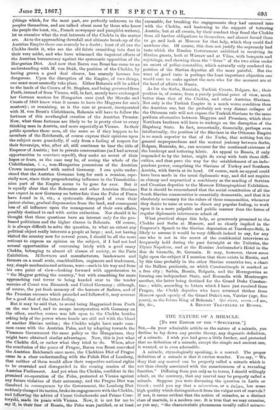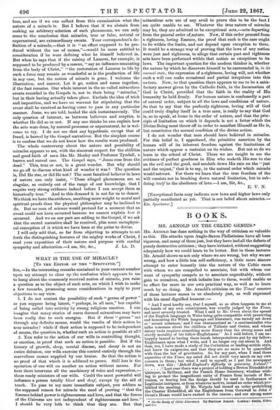THE NATURE OF A MIRACLE.
[To TILE EDITOR OF TILE " SPECTATOR.") SIR,—In your admirable article on the nature of a miracle, you decline to lay down any precise theory, any dogmatic definition, of a miracle. I wish you had gone a little further, and protested that no definition of a miracle, except the simple and ancient one, is wanted, or is even admissible.
A miracle, etymologically speaking, is a marvel. The proper definition of a miracle is that it excites wonder. You say, " We deny that any marvel can be properly called a miracle which is not thus closely associated with the consciousness of a revealing function." Differing from you only as to terms, I should willingly admit, on the contrary, that any marvel may be properly called a miracle. Suppose you were discussing the question in Latin or Greek ; could you say that a miraculum, or a 64/4,a, has some high quality which distinguishes it from the vulgar sort of marvels ? If not, it seems evident that the notion of miracles, as a distinct class of marvels, is a modern one. It is true that we may examine, as yob. say, "the characteristic phenomena usually called miracu-
lona, and see if we can collect from this examination what the nature of a miracle is. But I believe that if we abstain from making an arbitrary selection of such phenomena, we can only come to the conclusion that miracles, true or false, natural or supernatural, are extraordinary events. Your correspondent's de- finition of a miracle,—that it is " an effect supposed to be pro- duced without the use of means,"—would be more entitled to consideration if he were defining what he himself believed in. But when he says that if the raising of Lazarus, for example, is supposed to be produced by a means, " say an influence emanating from the body of Christ," "the restoration of Lazarus to life by such a force may remain as wonderful as is the production of life in any case, but the notion of miracle is gone, I welcome the illustration, and answer, Let it go, notion and name together, if the fact remains. Onr whole interest in the so-called miraculous events recorded in the Gospels is, not in their being " miracles," but in their having actually taken place. Exclude the idea of trick and imposition, and we have no warrant for stipulating that the event shall be received as having come to pass in any particular manner. Jesus, we are told, healed the sick instantaneously. The only question of interest, as between believers and sceptics, is whether He did so or not. If any one thinks he can explain how the acts were done, by natural processes or supernatural, he is wel- come to try. I do not see that any hypothesis, except that of fraud, is barred by the Gospel narratives. But the simplest course is to confess that we do not know how the results were produced.
The whole controversy about the nature and possibility of miracles appears to me, with the sincerest respect for the abilities and good faith of men like Mr. Mozley and Professor Tyndall, a barren and unreal one. The Gospel says, " Jesus rose from the dead." This, true or not, is a great wonder. But why should we go off to discuss what kind of wonder it was ? The question is, Did He rise, or did He not? The most fanatical believer in laws of nature can only insist, " These alleged phenomena are so singular, so entirely out of the range of our knowledge, that I require very strong evidence indeed before I can accept them as historically true." And to this demand it is not for us to demur. We think we have the evidence, ascribing more weight to moral and spiritual proofs than the physical philosopher may be inclined to do. But no man of science would pretend for a moment that an event could not have occurred because we cannot explain how it occurred. And we on our part are adding to the Gospel, if we ask that the sacred narrative shall be received, plus some metaphysi- cal conception of it which we have been at the pains to devise.
I will only add that, so far from objecting to attempts to set forth the distinguishing features of the mighty works of Christ, I read your exposition of their nature and purpose with cordial sympathy and admiration.—I am, Sir, &c., J. LL. D.































 Previous page
Previous page